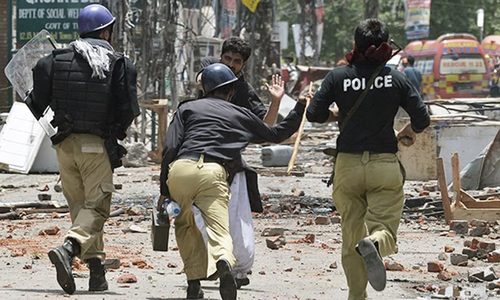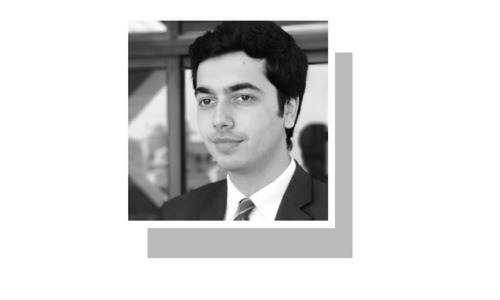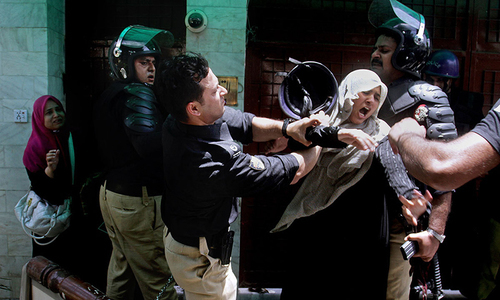A five-member Supreme Court bench on Wednesday wrapped up a petition requesting a new joint investigation team (JIT) to probe the 2014 Model Town incident and ordered the Punjab government to reconstitute a probe team to investigate the case.
The larger bench ─ constituted specially to debate a legal point today ─ comprising Chief Justice of Pakistan Mian Saqib Nisar, and Justices Asif Saeed Khosa, Sheikh Azmat Saeed, Faisal Arab and Mazhar Alam Khan Miankhel, decided to hold a hearing to determine whether a new JIT could be formed to probe the Model Town case which is still pending judgement.
Pakistan Awami Tehreek (PAT) chief Tahirul Qadri was among those who presented their arguments on the matter in court today.
"My lawyers are present for legal questions," he told the bench. "I will only present facts before the court."
"No case is political for the court," the chief justice remarked, ordering the lawyer behind the PAT chief to sit down.
Justice Khosa said that all statements would have to be recorded again.
"The trial has now come back to zero," Qadri said. He added that after the new government was elected and the larger bench constituted, the victims were more hopeful about the chances of an independent probe.
The trial of the accused persons is ongoing in the anti-terrorism court, he said, adding that there is a trial on both the cases together.
"What FIR was the JIT formed on the basis of?" Justice Khosa asked, to which Qadri responded that the police first formed the JIT on their own FIR.
"Later it was formed on our FIR," Qadri said. "The judicial commission gave its findings on the matter too."
The commission report, which was made public a few months ago, brought a lot of facts to light, the PAT chief said, telling the chief justice that of the 157 witnesses in the case, 23 had recorded their statements already.
"It is important to take an overview of the situation before the incident as well, to know why it happened," Qadri pointed out.
"To date our case has not been investigated," he claimed. The PAT chief was of the opinion that the requirements of an independent investigation were not met.
He recalled that the FIR was only registered after the party protested for two months, and that no statements from victims, PAT, the Punjab IGP or any relevant secretary were recorded.
"Can it even be called an investigation?" he questioned, to which the chief justice said: "Your point is that the probe was not transparent."
"If all people are presented before the JIT then the investigation can be better," Qadri said.
The PAT chief said the Model Town affectees had wanted a JIT other than the one formed earlier by the previous Punjab government.
"Did you raise your objections over the members of the JIT?" the chief justice asked, to which Qadri responded that he had written to the police chief numerous times expressing his objections over the JIT.
"The court needs to assess whether the JIT was independent or not," Justice Nisar said, at which Nawaz Sharif's lawyer chimed in, reminding the court that it included members of agencies.
"You should have approached this court earlier. Instead, you paralysed everything ─ along with the court ─ through your protests. The protesters hung their old clothes on court premises. Is this respect for the court? The path of the judges was also stopped," the top judge said.
"The people you used to go to are not bigger than the court," Justice Nisar told Qadri. "The court's doors have always been open. You went to those who had no ties to the case. You did not approach the appropriate legal authorities."
Former Punjab law minister Rana Sanaullah's statement to an earlier JIT was also shared in court. Qadri told the court that the removal of barriers was used as a pretext for halting PAT's political campaign.
"We did not receive any notice regarding the removal of barriers," the PAT chief said, adding that they were erected on court orders and removed the same way.
"Your point has been noted," Justice Azmat Saeed told Qadri.
After the court heard his arguments, it asked the Punjab Advocate General Ahmed Awais what the provincial government's stance on the formation of a new JIT was.
Awais responded that the Punjab government had no objections to the reconstitution of a JIT.
"If there are no objections, then get to work," the chief justice directed.
"The court needs to determine whether such a JIT can be made or not," Justice Khosa said.
"The law says that if the government deems it appropriate then it can form a JIT. We will have to see whether the court can also make a JIT," Justice Khosa added. "The government has already formed a JIT in the case ─ whether people are satisfied with it is another matter altogether. The trial court can summon people if it believes that is more appropriate."
The court subsequently ordered the Punjab government to form a new JIT to conduct a fresh investigation, and directed that the statements of the remaining witnesses must be recorded.
"The Punjab government has adopted the clear stance that it has agreed to form a new JIT," the court said, adding that it the probe team would be formed under Section 19 of the Anti-Terrorism Act.
The aim of the petitioner has, through this move, been fulfilled, the court noted, wrapping up the petition.
Qadri, while speaking to the media after the hearing, thanked the bench for the decision, saying all five judges had heard his arguments "with great interest".
"We are convinced that a JIT must be made," he said, adding that the provincial government had no reservations over the formation of a new JIT to conduct a fresh probe.
Model Town incident
On June 17, 2014, 14 people were killed and 100 others injured after police launched an assault on PAT supporters gathered outside the residence of Qadri in Model Town, Lahore.
A subsequent judicial inquiry report on the incident pointed fingers at then Punjab law minister Rana Sanaullah and the Punjab police for what had transpired that day.
From a reading of the conclusions of Justice Baqar Najafi's report, it is understandable why the provincial government fought tooth and nail to prevent its release.
It is also understandable why its publication was preceded by a lengthy press conference by Rana Sanaullah in which he sought to highlight the report's flaws, including what he called its reliance on "secondary evidence" and it, therefore, having no legal status whatsoever.
He kept referring to it as "defective", and the Punjab government made sure the Justice Najafi report was accompanied online by a one-man committee's report on a review of its flaws.
Delineating the chronology of events, Justice Najafi reported that then Punjab minister for parliamentary affairs Rana Sanaullah seemed to have already decided on June 16, 2014, that the PAT Chairman Qadri would not be allowed any opportunity to hold a long march from Rawalpindi to Lahore, as the latter had planned to do on June 23, 2014.
This single-minded determination of the minister to thwart Qadri's political objectives ended up influencing the police's heavy-handed strategy in dealing with the situation, which resulted in the needless loss of lives the very next day, Justice Najafi argued in the report.
Though Justice Najafi himself did not affix responsibility for the tragedy, he invited readers to review the facts and circumstances and "easily fix the responsibility of the unfortunate Minhajul Quran incident" themselves.














































